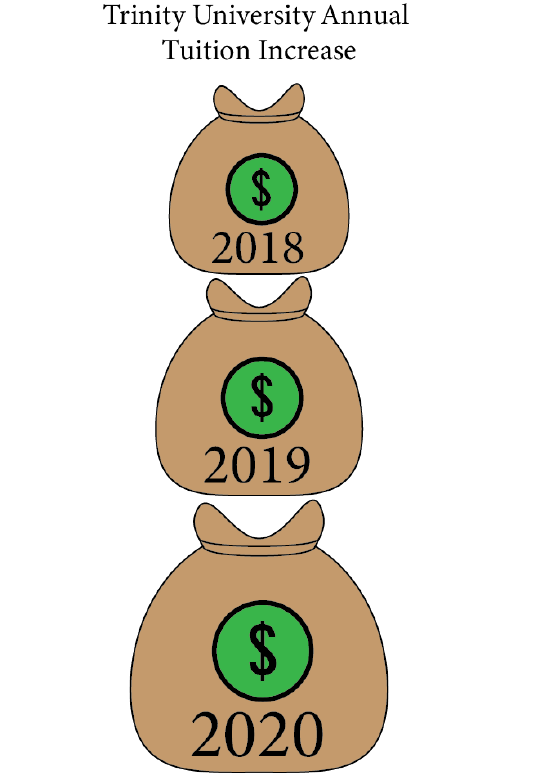graphic by Quinn Butterfield
Administration recently announced a four percent increase in tuition for the 2020-2021 academic year. But this shouldn’t come as a surprise to students: Tuition increases regularly.
The cost of tuition is reevaluated on a yearly basis and is dependent on recommendations from finance administrators and a Board of Trustees vote.
“What happens from a financial perspective each year is that the administration evaluates the financial needs of the institution and what’s required to provide the quality of education Trinity is known for. That results in the need to have marginal increases to tuition year over year. In the last few years, it has been a 4% increase from year to year. There is a recommendation made from a budget perspective that the finance side of the house will do for administration, which is then presented at the September Board of Trustees meeting, and it is ultimately the Board of Trustees that will vote on any approved changes to tuition or fees,” said Christina Pikla, director of Financial Aid.
Eric Maloof, Vice President for Enrollment Management, agreed, stating that intensive research is required to determine the cost of attendance each year.
“[Tuition adjustments] are done by Finance Administration and Enrollment Management we drive the research process. And then, what we do is bring a recommendation to the strategic enrollment group, including Student Affairs, Academic Affairs, Information Technology . If that is approved, we bring that recommendation to the Board of Trustees in the September board meeting,” said Maloof.
According to Pikla, tuition funds predominantly go towards sustaining campus operations and allow the university to run effectively.
“When you think about what it costs to run the university — all aspects of the university: keeping the lights on, paying salaries, facilities maintenance — tuition dollars are one of the predominant revenue streams to the university that keeps the operation moving forward,” Pikla said.
Diana Heeren, associate vice president for Finance, agreed, stating that it is common for universities to increase costs to fund regular operations.
“Yes, this is a permanent increase. As the costs related to educating students continue to rise, it is very common for colleges to increase tuition to offset a portion of those expenses. Trinity wants to provide the best possible experience and education for our students. Whether we are talking about faculty and staff compensation, maintaining the technology used in classrooms, or cleaning buildings on campus, expenses increase each year. We are always looking at creative ways to reduce costs, but this is very difficult to do without negatively impacting the services and facilities used by our students,” Heeren wrote in an email interview.
Trinity’s administration is cognizant of the impact of these increases and attempts to find balance between funding the university while still being sensitive to the financial positions of the students, according to Pikla.
“I know for sure that administration and staff are very sensitive to the increases for continuing students year over year. Your entering [first] year, you’re here and it is what it is. But you have the three other cycles where you are going to have to absorb an increase, as those occur. Having that be something that is not overly burdensome for family, but also allows the institution to maintain the level of academia we expect from a Trinity education,” Pikla said.
Maloof believes it is important to recognize that while tuition has increased, other fees have stayed consistent.
“We raised four percent on tuition, we froze room for the second consecutive year on campus — we did not increase room and we will not increase it again next year. We think that is the right thing to do, despite putting in close to $25 million into the dorms over the past summer. We will also not increase room in City Vista. And then we have a small increase in board, which is food, but that is under obligation with the contract we have with Aramark,” Maloof said.
Need-based aid scholarships are typically awarded on an individual basis, and the administration is currently looking to improve the accessibility of such funding, as the policies regarding aid are not consistent year to year.
“From a policy standpoint — we don’t have a policy of apply every year, and if you meet certain criteria, we will continue to extend a certain level of funding, but we do have generous aid awards. There are definitely things we can continue to do, and I am excited that those conversations are happening,” Pikla said.
Students whose financial situation has changed in response to the increase can reach out to Student Financial Services to assess their options moving forward.
“Definitely submit the renewal FAFSA application because that’s really the tool that gives us what we need to be able to work with a student. We are not always able to do things to increase gift aid, but if there are circumstances that are under reconsideration, I tell students we would be happy to take a look at it,” Pikla said.
Maloof also believes Student Financial Services is equipped to assist students in making long-term financial decisions regarding their education.
“We have a financial aid program that doles out close to $65 million. We are one of the only schools in the United States that has an incredibly robust merit scholarship program, which a lot of students are really appreciative of. And we also have a need-based scholarship program that is incredibly rich in integrity. Over half of our students need money to be here, 90 percent receive money, whether they need it or not,” Maloof said.







